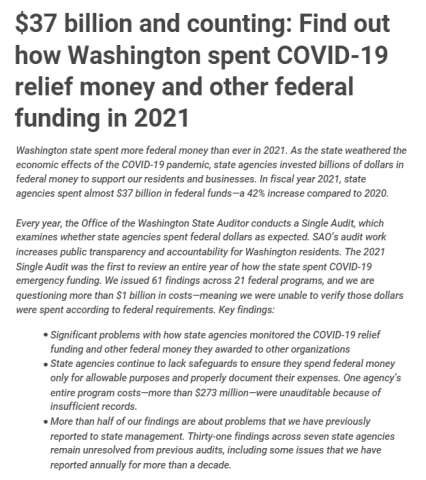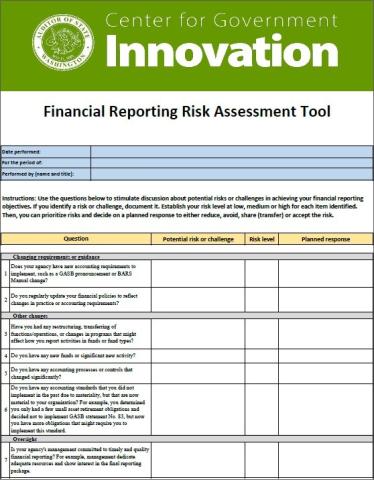The Audit Connection Blog
Preview your school district data in FIT
The Office of the Washington State Auditor is excited to announce the addition of school district financial data to our Financial Intelligence Tool (FIT). Before we make this data available to the public, we are inviting school districts to preview their data and become familiar with how to use the tool. ... CONTINUE READING
$37 billion and counting: Find out how Washington spent COVID-19 relief money and other federal funding in 2021
The 2021 Single Audit was the first to review an entire year of how the state spent COVID-19 emergency funding. We issued 61 findings across 21 federal programs, and we are questioning more than $1 billion in costs—meaning we were unable to verify those dollars were spent according to federal requirements. ... CONTINUE READING
Audit of federal dollars in Washington state reviews pandemic-related spike in spending
The Office of the Washington State Auditor’s annual audit of federal money spent in the state revealed 61 areas of concern across 21 federal programs. Because of a lack of documentation, auditors were unable to audit one entire program, calling into question at least $271 million in spending. ... CONTINUE READING
Are you ready for a federal Single Audit? SAO offers resources to help you avoid common audit issues
Navigating federal requirements and establishing controls in your government to ensure compliance can be challenging—even for governments that routinely receive significant amounts of federal dollars. That’s why over the past year we’ve updated some of our resources and published several articles on federal program requirements. With more local governments potentially needing Single Audits over the next few years, SAO’s blog articles and resources can help you address potential internal control weaknesses early to avoid audit issues. ... CONTINUE READING
SAO unveils new look for its resource library
We’re excited to announce the launch of our new, redesigned resource library. The new site features streamlined navigation, a cleaner interface, and a better user experience. Best of all, you’ll get to the resources you want in fewer clicks! ... CONTINUE READING
Five ways for leaders to recharge their batteries
Employees everywhere are searching for inspired leadership that emphasizes a culture that respects all employees and provides them opportunities for meaningful work where they can share their ideas for improvement. That’s why we are sharing our series of articles from late 2021 with you again in hopes that you can use them to recharge your leadership batteries this summer. ... CONTINUE READING
Protect your government's money with SAO's suite of cash receipting resources
We know governments face challenges managing cash collections and striking just the right balance between internal controls and the costs of those controls. That’s why SAO has published a variety of resources to help you put the proper safeguards in place. ... CONTINUE READING
SAO assistant director receives award for Fraud Magazine article
A leader of the Washington state auditor’s special investigations team was recently recognized for writing an article sharing lessons on uncovering Washington’s largest public misappropriation. ... CONTINUE READING
Picture this: FIT update offers new ways to see your data
We’ve updated our Financial Intelligence Tool (FIT) with fiscal year 2021 data. Curious how your peers around the state did in meeting the annual filing requirements? Our interactive infographic shows which governments filed on time, which filed late, and which haven’t filed at all. You can view the data by county or by entity type. ... CONTINUE READING
Rock your next financial reporting season with SAO’s new tool
A successful financial reporting season is one where you act to achieve your objectives rather than react to problems. To get there, you need the right kind of planning so you can spot the trouble ahead and take control early. Use SAO's new and improved financial reporting risk assessment tool to help you achieve your objectives. ... CONTINUE READING









